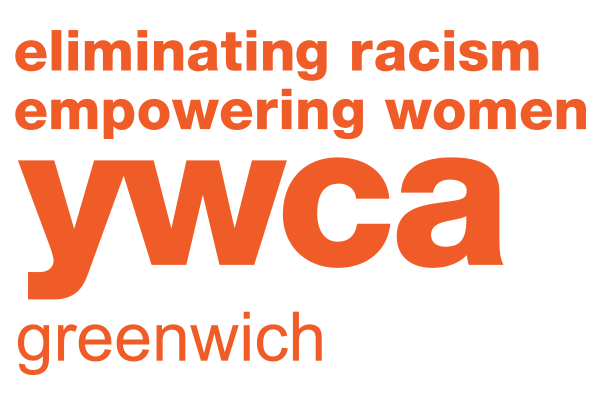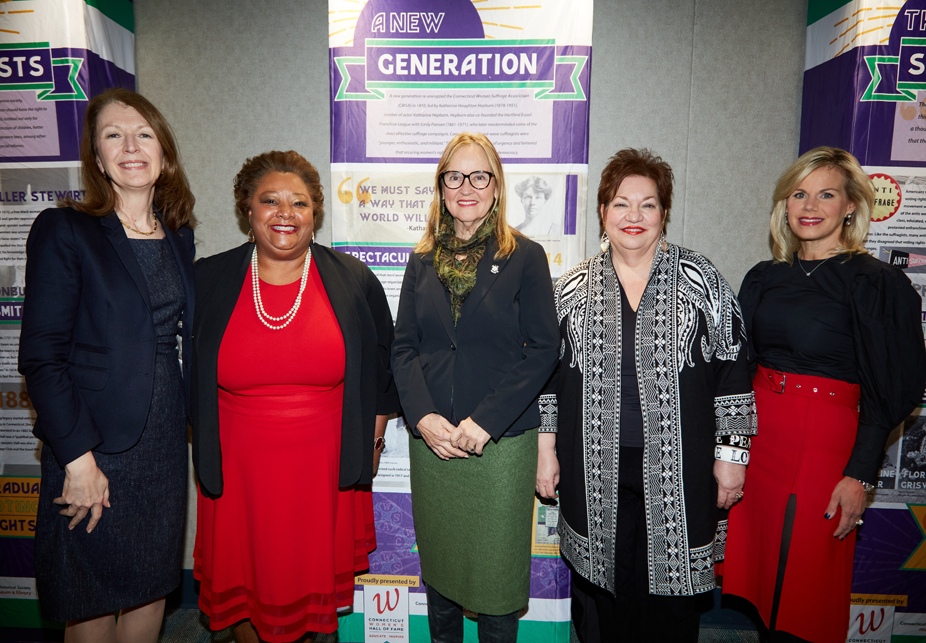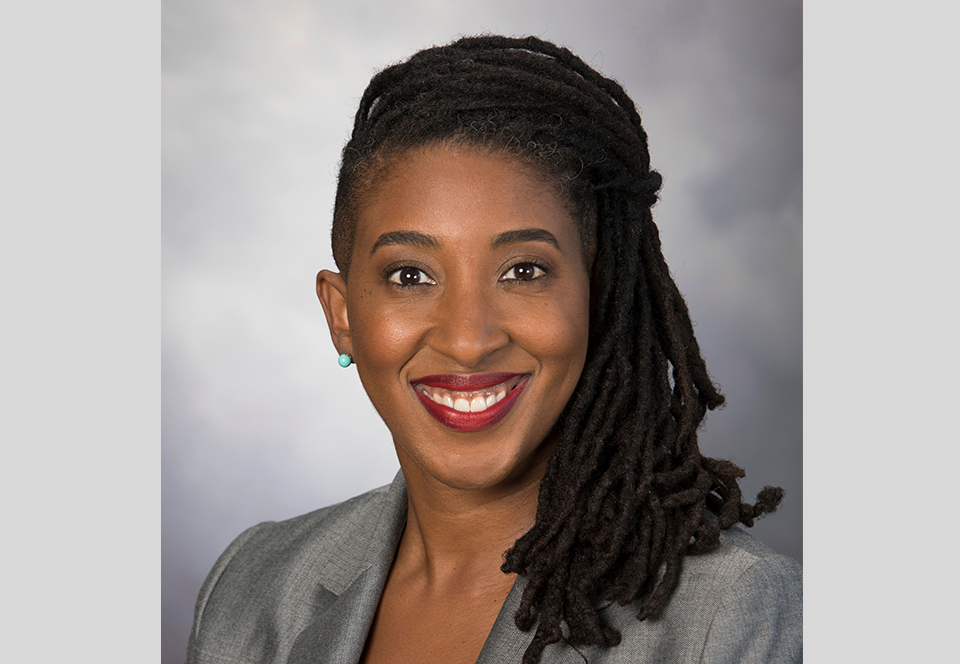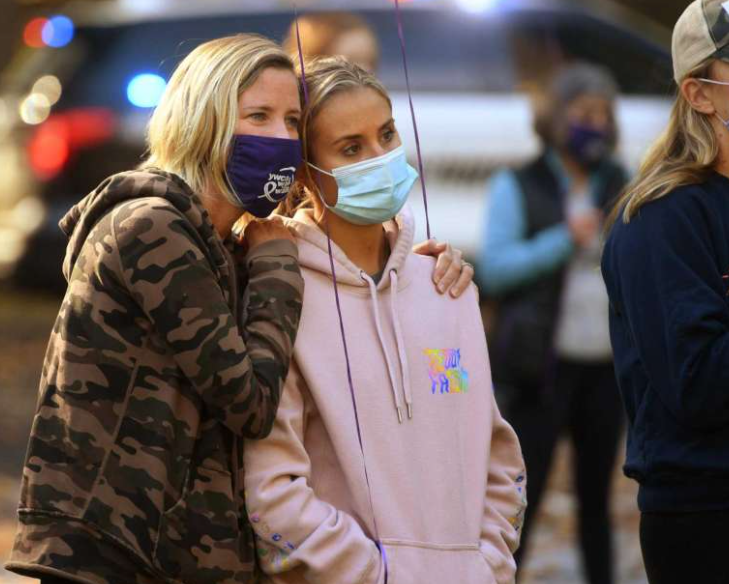
Teen Dating Violence Awareness and Prevention Month Kickoff
January 27, 2020
Winter/Spring Registration
February 3, 2020GREENWICH TIME by Tatiana Flowers 20.January.2020 — In 1957, on the steps of the Lincoln Memorial, Martin Luther King Jr. advocated for equal voting rights in a speech known as his “Give Us the Ballot” address. [Photo: Mary Lee A. Kiernan, Sheryl Battles, Denise Merrill, Patti Russo, Gretchen Carlson]
“So long as I do not firmly and irrevocably possess the right to vote, I do not possess myself,” King said. “I cannot make up my mind. It is made up for me.”
On Thursday night, in front of a crowd of more than 200 attendees, Pitney Bowes Executive Sheryl Battles, drew a personal connection to the 1950s statement.
“Literally, our maternal family’s surname speaks to the fact that we did not possess ourselves,” she said, telling the crowd at YWCA Greenwich that her ancestors’ last name is Cotton.
“Our foremother had to finish her quota of picking cotton that day before she could lay down and give birth — and then they gave that child the surname, Cotton,” she said. “My grandfather’s generation was the last generation to actually have that name.”
On election day in 2008, Battles took her 7-year-old daughter with her to vote and reiterated the story as they both stood in front of the ballot.
“I told her, ‘I want you to understand that these hands that literally were named for what we picked in servitude, are about to pick the leader of the free world,’” Battles recounted. ‘“Don’t ever forget the sacrifice — and the struggle — and the ultimate triumph to get the right to vote,’” she told her daughter.
The revelation was among many powerful personal accounts from four women at a community discussion honoring the work and legacy of King.
Each year, the Greenwich YWCA honors the civil rights leader by focusing on a topic “he would have cared about deeply,” said Mary Lee Kiernan, President & CEO of YWCA Greenwich.
On the centennial of the women’s suffrage movement, YWCA leaders convened an all-women panel to discuss topics including: acquiring the woman’s right to vote, the gender and race wage disparity, and workplace sexual harassment, among others.
From the 1848 Seneca Falls Convention, until ratification of the 19th amendment in 1920, women struggled to acquire the right to vote, said Denise Merrill, Connecticut secretary of the state. After ratification, 28 million women became eligible voters overnight, in what Merrill called “the greatest expansion of democracy in the history of the nation.”
But it was an incomplete revolution, she said. While 28 million women technically gained the right to vote, the acquisition didn’t actualize for black, Asian and Native American women — until the mid-1960s, when the Voting Rights Act enforced the law, she said.
She called the occurrence a “complicated history,” and said the centennial of the women’s suffrage movement compels her to renew her mission as the state’s top election official.
“I will push as hard as I can to ensure that everyone can actually actualize their vote,” she said. “Right now, I think it behooves all of us more than ever, to fight to maintain the things that these women fought for.”
Women’s struggles did not end with the Voting Rights Act, said Battles.
In 2020, white women in Connecticut earn, on average, 84 cents for every dollar a white male earns. Black women make 57 cents to every white male’s dollar. For Latinas, the number drops to 49 cents.
The pay gap doesn’t only impact women; it also affects children whose mothers are the primary wage earners in the household, said Battles.
It’s estimated, 70 to 80 percent of consumer purchasing decisions are made by women, according to Bloomberg. “If the person whose deciding has access to less money, what does that do to the economy?” Battles asked rhetorically.
Women of color also represent a growing and already large segment of the national population, she added.
“A bigger segment of the U.S. population is less capable of participating in the economy and of helping to drive the economy.” she said. “Think about what this is doing to the tax base, to the ability to support infrastructure — to a pipeline to keep us not only healthy within our communities but competitive within the global economy.”
Workplace sexual harassment is another widespread issue preventing women from advancing professionally, said Gretchen Carlson, a former Fox News Anchor, who said she’s experienced sexual assault and harassment at the hands of four men.
In 2016, she filed a lawsuit against the news network’s former CEO Roger Ailes and eventually settled for $20 million. At first, many people bashed her for making the allegations but soon after, hundreds, then thousands of women sent support through letters and by sharing their own experiences with sexual harassment and assault, she said.
Believing women, changing how workplace sexual harassment is reported and educating boys about the issue are at the forefront of solutions, she said.
As the conversation closed, Kiernan asked the four women what advice they’d give to empower women.
Patti Russo, executive director of The Campaign School at Yale University, encouraged young women to take more risks and “learn how to fail fabulously.”
tatiana.flowers@thehour.com



